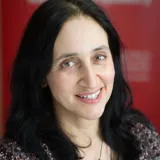“This funding presents a tremendous opportunity to bring together a new dynamic group of researchers to work with youth to expand the great work that we’re already undertaking with adults. There is a huge unmet need to provide mental healthcare to young people in African countries. There are many unanswered research questions about what works best to get youth with persistent depression and anxiety back on track with their education and social development, and we look forward to filling some of these gaps”
Professor Melanie Abas, King's IoPPN
24 January 2022
Professor Melanie Abas receives £2.75m in UKRI funding
Professor Melanie Abas, with members of a new Global Health Research Group, has received £2.75m in NIHR funding to learn how best to treat depression and anxiety in youth aged 15-24 in Ghana and Zimbabwe.

Professor Abas will co-direct the program with Associate Professor Dixon Chibanda of the University of Zimbabwe and the London School of Hygiene and Tropical Medicine. The new research group includes academics from KCL and from universities in Zimbabwe, Ghana, and Malawi, together with youth and representatives from government and non-governmental organisations.
Depression and anxiety prevent youth from productivity and innovation and from reaching their full educational and social potential - a critical issue in African countries, where 60% of the population are aged under 25. Depression and anxiety are key risk factors for self-harm and for suicide, which is the third leading cause of death in this age group. There is increasing knowledge about ways to help youth deal with the types of thinking, behaviour and emotions commonly seen in depression and anxiety. These approaches could feasibly be delivered by non-specialists in low-resource settings.
The Group's plan is to work with youth and caregivers to adapt and test a stepped-care intervention for youth with depression and anxiety, which is tailored to the needs of communities in Ghana and Zimbabwe. Those experiencing less severe symptoms will receive guidance and treatment from school-based and community services, while those in greater need ‘step up’ to more specialist assessment and treatment. Professor Chibanda and Professor Abas both have experience in this area and have already seen success with ‘The Friendship Bench’ for common mental disorders in adults in Zimbabwe. This is an evidence-based model that aims to enhance mental well-being and improve quality of life and is designed to be delivered by non-specialists.
The receipt of this funding will build upon the work of The Friendship Bench to provide targeted interventions to a younger audience –15-18 year-olds enrolled in Ghana’s free senior high school system and 15–24 year-olds in Zimbabwe in schools, colleges, and community health settings. It will evaluate the clinical and economic benefits of the intervention through running a clinical trial in senior high schools in Ghana. The team hopes also to be able to learn more about the ‘active ingredients’ of interventions for depression and anxiety in young people by building research capacity on youth mental health in Ghana, Zimbabwe and Malawi.
Professor Dixon Chibanda, Professor of Psychiatry at the University of Zimbabwe, and Director of the African Mental Health Research Initiative (AMARI) said, “This will give us an opportunity to consolidate our collective lessons from the past 10 years as we move towards scaling evidence-based interventions in Zimbabwe and beyond. This work is further strengthened by the formal endorsement of the mental health initiatives in Zimbabwe through the WHO Special Initiative.”
By the end of the program, the Group aims to have four completed PhDs for African early career researchers in youth mental health (in Zimbabwe, Ghana, and Malawi), two post-doc fellowships completed, and ten publications in open access journals, with at least 80% of these to be first or senior authored by an African researcher. Their longer-term vision is a strong interdisciplinary group of African-UK researchers in youth mental health, and for stepped-care intervention to be taken up by governments and NGOs to improve youth mental health.
Both Zimbabwe and Ghana have seen calls to develop more structured offerings for youth mental health care, even before the onset of the COVID19 pandemic. The planned research is intended to align with the stated priorities and planned pilot activities being led by each country’s Ministry for Health, or local and well-established NGOs.
Zimbabwe, for example, hopes to integrate mental health care into existing health and community services, scaling up the Friendship Bench for working age adults, and introducing a government pilot called ‘Catch Them Young’ which will provide psychological screening and first aid in schools.
Ghana is scaling up basic WHO mental health care training, and the NGO, BasicNeeds, is piloting mental health literacy training in nine schools.
For more information, please contact Patrick O’Brien (Senior Media Officer)





